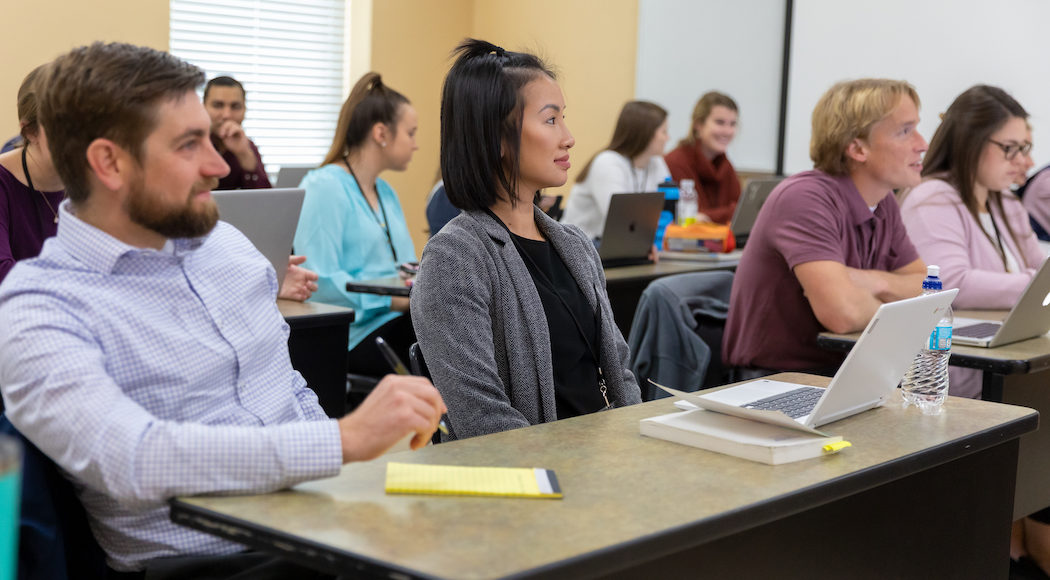Mission Statement
The mission of the Department of Occupational Therapy at Pfeiffer University is to educate professionals who can actively contribute to the profession through service, scholarship, and leadership, promoting occupational justice in local and global communities. The Pfeiffer occupational therapy graduate will be a reflective, compassionate, creative, and collaborative professional, committed to life-long learning. As such, the department will honor diversity, model and foster leadership, and facilitate spiritual, personal, and professional growth.
Core Values
Servant Leadership, Diversity, Creativity and Collaboration
Together, our vision, mission, and core values express what we believe in and guide our aspirations not only for students but also for the occupational therapy profession as a whole. The Pfeiffer MSOT program is dedicated to upholding a highly collegial and supportive environment, one that is characterized by diverse and collaborative interactions among faculty, staff, and students. We expect our faculty, students, and staff to strive for, and to uphold to the best of their abilities, high standards of excellence and professionalism in all their endeavors. We also help one another achieve those standards, remembering that our highest calling is to help people with daily living challenges participate in everyday occupations that promote their development, quality of life, health, and well-being.
- Act as an advocate to educate the public, to promote consumer health and wellness, and to provide community and professional leadership and service.
- Demonstrate skill that shows effective communication and appreciation for diversity, cultural differences, occupational differences, and backgrounds of individuals.
- Employ technology in teaching, learning, and adaptation of the environment.
- Engage in ethical behaviors and attitudes that demonstrate responsibility in adhering to the Code of Ethics and professional standards.
Philosophy of Occupational Therapy
Our program’s belief is consistent and in agreement with the Philosophical Base of Occupation Statement by the AOTA (revised, 2017), which is as follows:
Occupations are activities that bring meaning to the daily lives of individuals, families, and communities and enable them to participate in society. All individuals have an innate need and right to engage in meaningful occupations throughout their lives. Participation in these occupations influences their development, health, and well-being across the lifespan. As such, participation in meaningful occupation is a determinant of health.
Occupations occur within diverse social, physical, cultural, personal, temporal, or virtual contexts. The quality of occupational performance and the experience of each occupation are unique in each situation due to the dynamic relationship between factors intrinsic to the individual, the contexts in which the occupation occurs, and the characteristics of the activity.
The focus and outcome of occupational therapy are individuals’ engagement in meaningful occupations that support their participation in life situations. Occupational therapy practitioners conceptualize occupations as both a means and an end to therapy. That is, there is therapeutic value in occupational engagement as a change agent, and engagement in occupations is the ultimate goal of therapy.
Occupational therapy is based on the belief that occupations may be used for health promotion and wellness, remediation or restoration, health maintenance, disease and injury prevention, and compensation/adaptation. The use of occupation to promote individual, community, and population health is the core of occupational therapy practice, education, research, and advocacy.
Educational Philosophy
The faculty members of the MSOT program at Pfeiffer University hold the following beliefs about humans, how they learn, and education. These serve as the foundation for the curriculum and the selection of instructional methods. Each individual is valued for his or her uniqueness. Human behavior consists of dynamic interactions among the individual, the environment, and the demands of the occupation. People derive a sense of self– fulfillment through mastery and meaningful participation in daily occupations. An individual’s capacity to engage with the world through occupational performance or participation in productive and purposeful activities is crucial for the successful fulfillment of societal roles and expectations. Occupational performance can be enabled, challenged, or compromised due to illness, injury, developmental issues, or aging. When this occurs, humans are motivated to re-engage in those productive activities that are meaningful and that meet their goals. When given opportunities to use problem-centered approaches, people are motivated to utilize higher-order critical thinking and to become resourceful and creative.
The Principles of Adult Learning best articulate our belief of how humans learn (Knowles, 1984; Lieb, 1991) and the implication for the education process. Adult learners are autonomous and self-directed. The content of the curriculum is organized in a manner that provides the learner with a clear sense of direction and to promote the achievement of the learning outcomes.
- Adult learners bring to the educational process knowledge and a wide variety of life experiences. Learning becomes more relevant when individuals connect or relate new content to previously learned information. The educator must provide opportunities for students to openly communicate and integrate their thoughts, knowledge, and ideas.
- Adults learners are goal-oriented and have an inner desire to learn and to become productive individuals. Learning is facilitated when activities are goal-directed, purposeful, and meaningful for the learner.
- Adult learners are relevancy-oriented. Students must comprehend the value, impact, and usefulness of what they learn to future practice and their professional interest.
